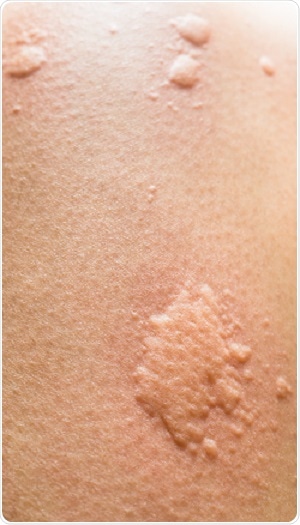Hives are characterized by a skin rash that is raised and red in colour. They are known by different names such as wheals, welts, nettle rash, and urticaria. They can be as small as a mosquito bite, or large enough to cover a substantial portion of the body. Often smaller rashes may develop on the torso and eventually spread to cover a large area.

© Panudda / Shutterstock.com
Hives are considered an allergic reaction, which can be triggered by specific foods, drugs, environmental reasons and more. Hives are an extremely common skin rash but different individuals may suffer from them due to different triggers.
Symptoms seen in hives
The angry red welts on the skin are the most common symptom of Hives. Some may be small and round like an insect bite, whilst others may be like long strips similar to the welts that develop after a whipping. The rashes are extremely itchy and tend to appear in clusters over a certain part of the body.
The rashes usually fade after some time; however these are often replaced by new rashes if the body is still fighting the allergen. If the rashes stay for 6 weeks or less they are medically referred to as Acute Urticaria. Should the rashes continue to form on the skin beyond 6 weeks, the condition is called Chronic Urticaria. Chronic Urticaria can bother the baby for years, even extending into adulthood.
While most Hives rashes are harmless and subside on their own, there is the risk of Anaphylactic Shock. Symptoms of Anaphylactic Shock include a swelling up of the tongue and throat muscles – this can choke the baby and lead to breathing difficulty. The inadequate supply of oxygen can even cause the baby to collapse and lose consciousness. This is a medical emergency and the baby should be taken to the hospital right away.
Common causes of hives
The nettle rash or hives rash is formed on the skin when histamine is released by the body. The release of histamine causes blood plasma to leak from the vessels carrying blood close to the surface of the skin. The extra fluid under the skin causes the typical swelling associated with a hives rash.
Histamine is released as part of a local immune system response to battle an inflammation within the body. The inflammation can be caused by various agents such as insect stings, specific food items, dander of pets, pollen from flowers, drugs of a specific type, exposure to extreme temperatures and even a viral infection.
In chronic urticaria the immune system often misfires and attacks healthy tissues of the body. The triggers can also become worse in warm weather and summer season sees many more reported cases of hives than winter. It can be difficult to pinpoint the exact cause of hives in a baby, but paying attention to the baby’s diet can help identify food allergies.
Treating hives in babies
In mild cases of acute urticaria, no medication is given as the rash will resolve itself within a few days or weeks. Cold compresses and over-the-counter ointments work well for the constant itching sensation. If the child is in much discomfort, the doctor may recommend antihistamines such as cetrizine, fexofenadine and loratadine.
In severe cases where the rashes have persisted beyond six weeks, the doctor may recommend corticosteroids like prednisolone for three to five days. The steroid tablets suppress the immune system but are used rarely with babies due to their significant side effects.
Angioedema
Those babies suffering from chronic urticaria may develop a complication called Angioedema. In this condition there is a considerable accumulation of blood plasma, which causes swelling of the deeper layers of the baby’s skin.
A baby suffering from Angioedema will suffer from swelling on the lips, puffiness of the eyes, bumps on the hands, feet and even on the genitals. It can be dangerous as the swelling may cause breathing difficulties for the baby. It will usually be treated with a combination of antihistamines and steroids.
Managing hives in babies
A baby with hives can be cranky and irritable, so the parent must try to ensure they are as comfortable as possible.
Some actions may be taken for effective management of hives:
- Check that the rash is not symptomatic of any other illness the baby has, then ensure that any known triggers are avoided.
- Keep the baby in a cool room.
- Don’t let the baby scratch the rashes.
- Use cold compresses to stem the urge to scratch the rash.
- Get antihistamine ointments for reducing the allergic reaction of the immune system.
- Keep the doctor informed in case there is an increase in severity.
References:
Further Reading
Last Updated: Jan 1, 2023